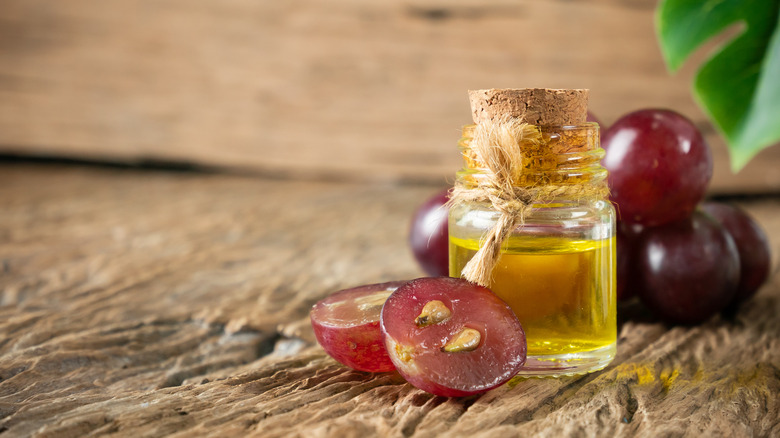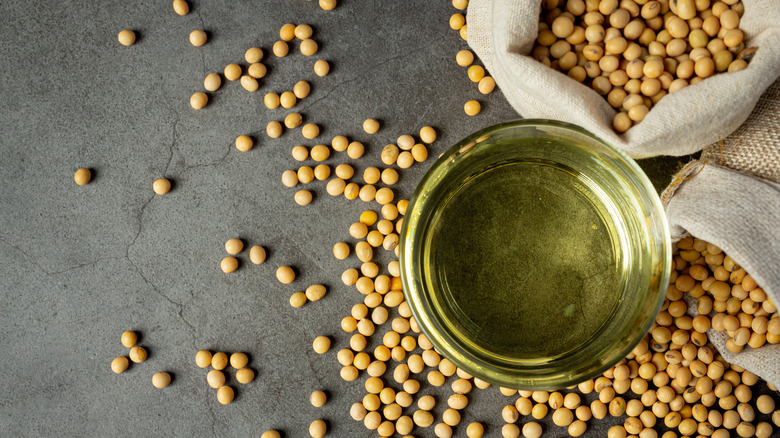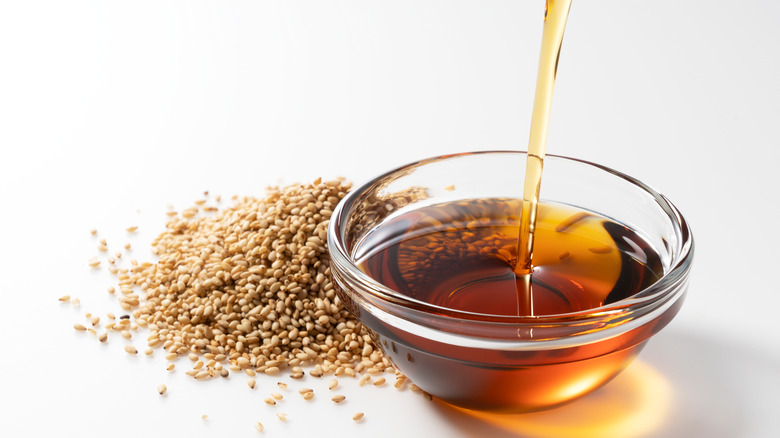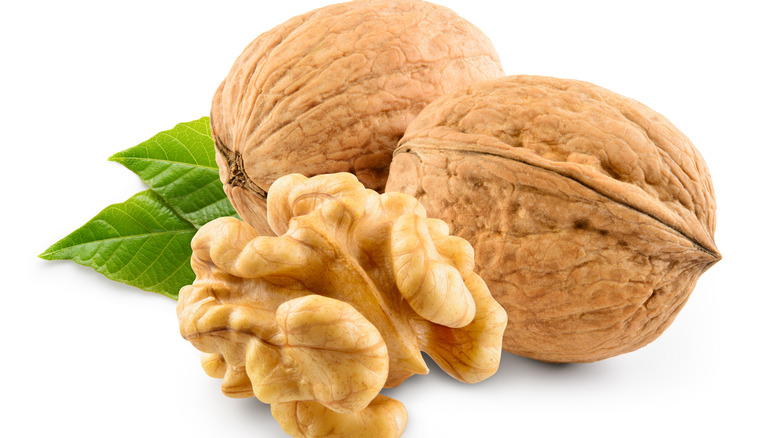10 Best Substitutes For Peanut Oil
We may receive a commission on purchases made from links.
Peanut oil, also known as arachis oil or groundnut oil, according to Healthline, is simply the oil derived the edible seeds of the peanut plant (scientific classification: Arachis hypogaea, via PeanutBase). Or in other words it is the oil sourced from the peanut itself, when in its purest form or in a refined form. Peanut oil is prized by chefs around the world — an in particular those steeped in various Asian cuisines — for its high smoke point (it does not combust until 450 degrees Fahrenheit, according to MasterClass), and for the subtle nutty flavors it can impart into various dishes.
But not all peanut oils found on store shelves are one and the same.
In fact, the most common "peanut oil" available at many lower cost retailers is not pure peanut oil at all, but rather a peanut oil blend also featuring cheaper oils such as canola or soybean oil. Also common is so-called refined peanut oil in which the liquid has been refined, deodorized, and bleached, a process that removes the dangerous peanut allergen but also removes much of the flavor that makes the oil unique. Cold pressed and gourmet peanut oils maintain the rich flavor derived from the peanut and can be used in cooking or in their pure form, though of course they do still have the allergens that can cause severe symptoms in some people, including but not limited to redness and rashes on the skin, digestive discomfort and diarrhea, a runny nose, and in severe cases anaphylaxis, which can be life threatening as it leads to constricted airways, a drop in blood pressure, and shock, according to The Mayo Clinic.
Whether you must eschew peanut oil for health concerns or you simply don't have any of the stuff handy, here are 10 good substitutions for peanut oil.
1 - Canola oil
Canola oil, also called rapeseed oil based on the plant from which it is sourced, according to Web MD, is a great substitute for peanut oil as it has almost the same smoke point (right around 400 degrees Fahrenheit) so it performs the same way in cooking, and because it is a neutral oil like peanut oil, imparting even less flavor into a dish than the oil for which it's standing in.
Canola oil also has the benefit of being quite affordable, often priced well lower than the cost of peanut oil and of other oil options as well. It can be used in a direct one-for-one swap for peanut oil whether you are deep frying, stir frying, using the oil in dressings and drizzles, and in other culinary applications. Canola oil, like peanut oil, is high in omega-6 fats, which are beneficial to the body in limited quantities, as too much omega-6 can cause inflammation; unlike peanut oil, canola oil is also high in the even more desirable (and less deleterious when in larger volume) omega-3 fatty acids, which are beneficial for heart health and reduced blood pressure.
Just note that quite often, much of the canola oil you may be able to buy is heavily processed, especially when bought in bulk sizing, and the processing can remove much of the healthful benefits of the oil. Canola oil has a shelf life of two years when its container is sealed, according to Still Tasty, and unlike some other oils, which can grow rancid, will often remain safe to consume for even longer.
2 - Sunflower oil
Refined sunflower oil (or sunflower seed oil, as it is often and accurately called) is a great stand-in for peanut oil, and indeed most sunflower oil you will find is refined, even organic options. According to PCC Markets: "Oils recommended for high-heat cooking and deep-frying are 'high oleic' safflower, sunflower, and peanut oil. These oils are from varieties high in monounsaturated fats, which are well-suited for high heat." So you can use sunflower oil just like you would use peanut oil even when the heat is on, so to speak, with a one-to-one swap. Like peanut oil, sunflower oil has a slight nutty flavor that can improve some dishes but that is subtle enough not to be noticed in others.
Sunflower oil is a great stand-in for peanut oil for essentially all reasons save one: the cost. "Sunflower oil has become the most expensive vegetable oil in the world, its prices in Europe exceeded the prices of rapeseed oil for the first time in four years," according to an AgriWell report from late 2020. That noted, the oil is still priced within the budget of most cooks, so while perhaps not a great choice for deep frying based on its cost, it is a fine choice to use instead of peanut oil in most cases, and it can readily be found in many stores or online.
3 - Safflower oil
Safflower oil has one of the highest smoke points of any of the relatively common cooking oils, not combusting until an impressive 510 degrees Fahrenheit, according to MasterClass, so in some ways it outperforms peanut oil. Overall, it is a fine direct substitute for peanut oil because it shares many of the same properties, namely a neutral taste. Just be sure you are using a monounsaturated safflower oil, as it is low in saturated fat and healthy for the body, whereas polyunsaturated safflower oil can hav negative effects on the heart and arteries and can even increase metastasis, or the growth and spread of cancers, according to Above House.
Monounsaturated safflower oil can stand in for peanut oil in frying, in sauces, in baking, and in really any use case. Its flavor is so mild as to be almost nondescript. Safflower oil is often quite affordably priced, according to Centra Foods, which is just one more reason it is a good choice to us in place of peanut oil. If unopened and properly stored (in a cool, dry, and dark spot, e.g.) safflower oil has a shelf stable life of up to two years, which exceeds the approximate one-year shelf life of unopened peanut oil. This oil can often be purchased in bulk, such as in gallon containers, thus it is a good choice for deep frying when peanut oil is not available or not a viable option.
4 - Grapeseed oil
Considering the immense amount of grapeseeds needed to produce a useful amount of grapeseed oil, it's amazing how relatively affordable this oil is. According to Above House: "Grapeseed oil is extracted from the grape seeds left behind after the process of pressing grapes in winemaking. It is a painstaking task because each little seed only produces a tiny bit of oil. In fact, you will need a ton of grapes to produce just 1 bottle of grapeseed oil." Fortunately the wine industry produces a plethora of grapes, thus this oil is hardly unaffordable, despite being priced above most.
Grapeseed oil has a notably lower smoke point than peanut oil, potentially igniting above 390 degrees Fahrenheit (via MasterClass) but based on its cost, you would seldom use it for deep frying applications where that would be a risk anyway. And when refined, the smoke point of the oil is increased some, though it remains well lower than that of peanut oil. Grapeseed oil has a flavor usually described as bland if described at all, so while it will not impart the nuttiness or faint peanut flavors of peanut oil, it will have no deleterious impacts on the taste of any dish when used as a stand-in. It can be used as a direct swap for peanut oil in most cooking.
5 - Almond oil
Despite the fact the peanut is not a nut (or a pea, per say — it's a legume, which can also be said of the pea) peanut oil and almond oil share very similar properties, including a nutty flavor prized in many cuisines and in specific dishes. Cold pressed almond oil is great for use in sauces, dressings, and drizzles where that nutty flavor will enhance the taste of the other foods, whereas for frying or other cooking, use refined almond oil as the stand in for peanut oil (via Better Homes and Gardens).
Almond oil (refined almond oil, to be clear) has a smoke point of 430 degrees Fahrenheit, according to La Tourangelle, and it is well suited to stir frying or for use on foods that will be grilled or roasted at high temperatures. This oil can be used as a direct stand-in for peanut oil in almost all types of cooking. Note that almond oil is also very common for use in topical products, such as for the hair and skin, so be sure you are buying an almond oil meant for use in cooking if you are choosing it as a substitute for a peanut oil.
6 - Vegetable oil
Generally speaking, vegetable oil is a find stand-in for peanut oil in all sorts of cooking, and as it is usually quite affordable, it's a good choice for use in lieu of peanut oil for deep frying when you need a large volume of oil. It usually has a similar smoke point to peanut oil and most vegetable oils are quite neutral in flavor and thus won't affect the taste of your dish. The problem with vegetable oil can come from the fact that, according to Time, it is far from a precise term. In fact vegetable oil may refer to a pure canola or soybean oil, for example, or to a blend of multiple different oils, so it's important you read the label and know what you are actually getting.
With that in mind, vegetable oil is a fine choice for all sorts of uses given that low cost, but it's hardly the healthiest oil, often packing lots of saturated fats, so it's best to choose vegetable oil when need be, but stick with peanut oil or some other option when another option is available.
7 - Soybean oil
The soybean is a pretty impressive little legume, really. It can be made into soy sauce, into tofu, into soy milk, and so much more, including, of course, the source for soybean oil, to name just a few of its hundreds of uses, according to Britannica. Soybean oil can be used as a direct one-to-one swap for peanut oil, according to Food Champs, and is suitable for essentially all of the same uses in cooking, given its smoke point that almost exactly mirrors that of peanut oil and its neutral taste. (And contrary to common misconception, soybean oil does not have an unpleasant scent, at least not unless it has turned rancid.)
While one of the most abundant cooking oils on earth and suitable for frying, baking, roasting, and more, according to Healthline, soybean oil is less healthy than some other options. It is quite high in omega-6 fatty acids, which as noted can cause inflammation issues, it may lead to weight gain and body fat retention, and unlike you find with many oils, a surplus consumption of soybean oil may be bad for blood sugar management.
8 - Sesame oil
Be very careful when selecting a sesame seed oil, because they range in flavor from the almost totally bland to the almost overpowering. According to Web MD: "Sesame oils from raw seeds are light in color and have a delicate, neutral flavor. Toasted varieties, on the other hand, are darker, richer, and have a nuttier taste. Both have many culinary applications. Sesame oil is often used to sauté meats and vegetables or is added to dressings and marinades." To replace a peanut oil used for cooking, you will want a pale, non-toasted sesame oil, and varieties of this type can be used all but interchangeably with peanut oil.
Sesame oil has a smoke point around 410 degrees Fahrenheit according to MasterClass, so it can't withstand quite as much heat as peanut oil, but up to that point it will handle in almost just the same manner. It has a nutty flavor similar to peanut oil, according to Better Homes and Gardens, and as sesame oil is common in Asian cooking, like peanut oil, it's no surprise the two can stand in for one another. Sesame oil would be one of the best choices to replace peanut oil were it not for the fact that toasted sesame oil has such a strong flavor and that many sesame oils are on the pricier side.
9 - Walnut oil
If you are looking to replace a cold-pressed, full-flavor peanut oil that will be used in a sauce, a drizzle, or a relatively low-heat recipe, such as in baked goods, then walnut oil is a great choice and can stand in for peanut oil in equal proportions. According to MasterClass: "Many oils also impart their own distinct flavors. Sometimes, this is a desirable quality — for example, sesame oil imparts a distinctly Asian flavor to dishes. Walnut oil, virgin coconut oil, and hemp seed oil each impart a strong, savory flavor of their own." While often quite expensive, walnut oil can make the flavor of an entree, salad, side, or dessert pop with unique taste.
On the other hand, walnut oil is a very poor choice for most high heat cooking and can't well be used for peanut oil at all. Walnut oil has a very low smoke point of just 320 degrees Fahrenheit, and when it burns it can become unpleasantly bitter, potentially ruining any other foods it touches, if not ruining an entire dish. Simply put, walnut oil is best used cool if it will be used at all, and that includes when it is standing in for peanut oil.
10 - Corn oil
Like the crop from which its sourced, corn oil is cheap and plentiful. But unlike corn, which actually boasts many more positive health attributes than most credit the foodstuff for (along with some deserved and accurate negatives), according to Healthline, corn oil is quite an unhealthy option by most metrics. Another Healthline article states in part: "Corn must go through a complex refining process to produce corn oil. This process gives the oil many unique characteristics, though not all of them are positive." It's high in fat, and not in good, healthy fats, it can cause inflammation, and it's high in calories. Though corn oil is very high in beneficial vitamin E, it should be noted.
Negatives aside, for occasional use as a substitute for peanut oil, corn oil is a fine choice. As noted, it is very affordable, and it handles much like peanut oil, with same smoke point of 450 degrees and with a very neutral flavor that will not impart any off notes to your cooking, or really any noticeable taste at all, for that matter. Corn oil is commonly used in refined food products like nondairy butter substitutes, and it is also common in industrial applications, serving as a lubricant for machinery, as fuel for diesel engines (or a base for ethanol that can be burned in combustion engines) and in cosmetic products like soaps.










